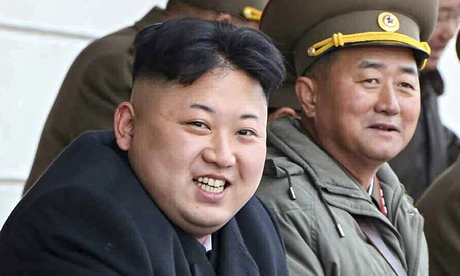queenislam
★★★I LOVE ALLAH★★★
Assalamu'alaikum!
greeting.
21Dec1024
US asked for China's help on N. Korea cyberattacks: official.
The United States has asked China to help block cyber attacks from North Korea as it weighs a response to the crippling hack of Sony Pictures, a US official said Saturday.
"We have discussed this issue with the Chinese to share information, express our concerns about this attack and to ask for their cooperation," a senior US administration official told AFP.
The US blames the isolated state for the hacking that prompted the cancellation of the Christmas Day release of "The Interview," a madcap romp about a CIA plot to kill leader Kim Jong-Un that infuriated the North.
North Korea called Saturday for a joint investigation with the US into the crippling attack on Sony, denouncing Washington's "slandering" after President Barack Obama warned Pyongyang of retaliation.
China is North Korea's closet ally, and has traditionally had long-standing influence with the leaders of the hermit state.
The US administration official said that in "our cybersecurity discussions, both China and the United States have expressed the view that conducting destructive attacks in cyberspace is outside the norms of appropriate cyber behavior."
The US and China last year set up a special panel to discuss cybersecurity.
But earlier this year, in an unprecedented move Washington charged five members of a shadowy Chinese military unit with hacking US companies to winkle out their trade secrets.
In the first-ever prosecution of state actors over cyberespionage, a federal US grand jury indicted the five on charges of breaking into US computers to benefit Chinese state-owned companies, leading to job losses in the United States in steel, solar and other industries. The five remain at large however.
It is unclear how the United States will choose to retaliate against North Korea.
Addressing reporters after the FBI said Pyongyang was to blame, Obama said Washington would never bow to "some dictator."
"We can confirm that North Korea engaged in this attack," Obama said.
"We will respond. We will respond proportionately and we'll respond in a place and time and manner that we choose."
~News.
Thank you for reading,
~Wasslam.
greeting.
21Dec1024
US asked for China's help on N. Korea cyberattacks: official.
The United States has asked China to help block cyber attacks from North Korea as it weighs a response to the crippling hack of Sony Pictures, a US official said Saturday.
"We have discussed this issue with the Chinese to share information, express our concerns about this attack and to ask for their cooperation," a senior US administration official told AFP.
The US blames the isolated state for the hacking that prompted the cancellation of the Christmas Day release of "The Interview," a madcap romp about a CIA plot to kill leader Kim Jong-Un that infuriated the North.
North Korea called Saturday for a joint investigation with the US into the crippling attack on Sony, denouncing Washington's "slandering" after President Barack Obama warned Pyongyang of retaliation.
China is North Korea's closet ally, and has traditionally had long-standing influence with the leaders of the hermit state.
The US administration official said that in "our cybersecurity discussions, both China and the United States have expressed the view that conducting destructive attacks in cyberspace is outside the norms of appropriate cyber behavior."
The US and China last year set up a special panel to discuss cybersecurity.
But earlier this year, in an unprecedented move Washington charged five members of a shadowy Chinese military unit with hacking US companies to winkle out their trade secrets.
In the first-ever prosecution of state actors over cyberespionage, a federal US grand jury indicted the five on charges of breaking into US computers to benefit Chinese state-owned companies, leading to job losses in the United States in steel, solar and other industries. The five remain at large however.
It is unclear how the United States will choose to retaliate against North Korea.
Addressing reporters after the FBI said Pyongyang was to blame, Obama said Washington would never bow to "some dictator."
"We can confirm that North Korea engaged in this attack," Obama said.
"We will respond. We will respond proportionately and we'll respond in a place and time and manner that we choose."
~News.
Thank you for reading,
~Wasslam.

